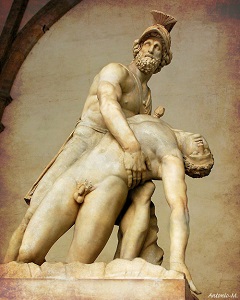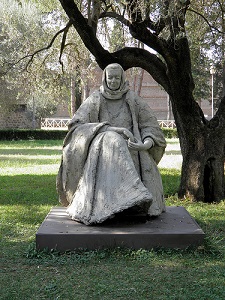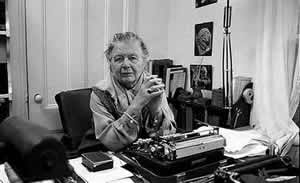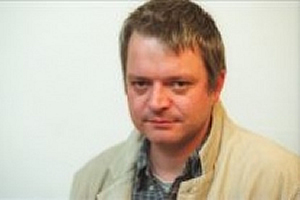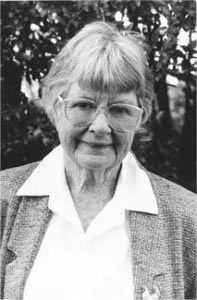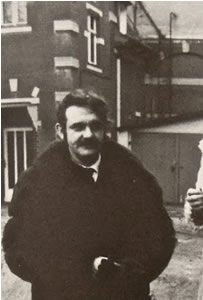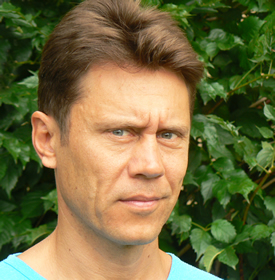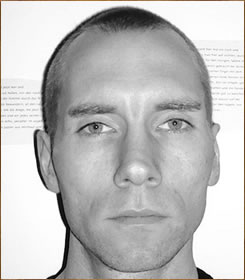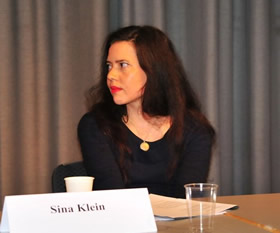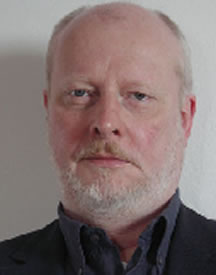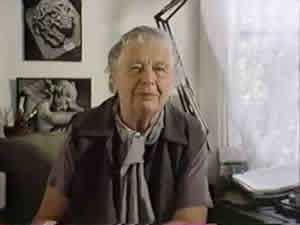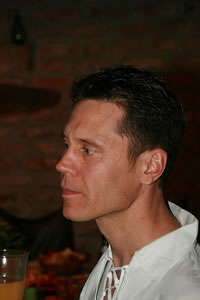De Belgisch-Amerikaanse, Franstalige schrijfster Marguerite Yourcenar werd geboren in Brussel op 8 juni 1903. Zie ook alle tags voor Marguerite Yourcenar op dit blog.
Uit: Memoirs of Hadrian (Vertaald door Grace Frick, in samenwerking met de schrijfster)
“Besides, a good three-quarters of my life escapes this definition by acts: the mass of my wishes, my desires, and even my projects remains nebulous and fleeting as a phantom; the remainder, the palpable part, more or less authenticated by facts, is barely more distinct, and the sequence of events is as confused as that of dreams. I have a chronology of my own which is wholly unrelated to anything based on the founding of Rome, or on the era of the Olympiads. Fifteen years with the armies have lasted less long than a single morning at Athens; there are peoples whom I have seen much of through out my life whom I shall not recognize in Hades. Planes in space overlap likewise: Egypt and the Vale of Tempe are near, indeed, and I am not always in Tibur when I am here. Sometimes my life seems to me so commonplace as to be unworthy even of careful contemplation, let alone writing about it, and is not at all more important, even in my own eyes, than the life of any other person. Sometimes it seems to me unique, and for that very reason of no value, and useless, because it cannot be reduced to the common experience of men. No one thing explains me: neither my vices nor my virtues serve for answer; my good fortune tells more, but only at intervals, without continuity, and above all, without logical reason. But the mind of man is reluctant to consider itself as the product of chance, or the passing result of destinies over which no god presides, least of all himself. A part of every life, even a life meriting very little regard, is spent in searching out the reasons for its existence, its starting point, and its source. My own failure to discover these things has sometimes inclined me toward magical explanations, and has led me to seek in the frenzies of the occult for what common sense has not taught me. When all the involved calculations prove false, and the philosophers themselves have nothing more to tell us, it is excusable to turn to the random twitter of birds, or toward the distant mechanism of the stars.
Marullinus, my grandfather, believed in the stars. This tall old man, emaciated and sallow with age, conceded to me much the same degree of affection, without tenderness or visible sign, and almost without words, that he felt for the animals on his farm and for his lands, or for his collection of stones fallen from the sky. He was descended from a line of ancestors long established in Spain, from the period of the Scipios, and was third of our name to bear senatorial rank; before that time our family had belonged to the equestrian order. Under Titus he had taken some modest part in public affairs. Provincial that he was, he had never learned Greek, and he spoke Latin with a harsh Spanish accent which he passed on to me, and for which I was later ridiculed in Rome.”
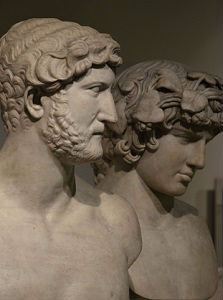
Marguerite Yourcenar (8 juni 1903 – 17 december 1987)
Hadrianus en Antinous, marmeren borstbeelden in het British Museum
De Georgische schrijfster en regisseuse Nino Haratischwili werd geboren op 8 juni 1983 in Tbilisi. Zie ook alle tags voor Nino Haratischwili op dit blog.
Uit: Het achtste leven (Vertaald door Elly Schippers en Jantsje Post)
“Eigenlijk heeft dit verhaal meer dan één begin. Ik vind het moeilijk om er een te kiezen. Omdat ze allemaal het begin vormen. Je zou dit verhaal kunnen beginnen in een oud huis in Berlijn — niet bepaald opvallend en met twee naakte lichamen in bed. Met een man van zevenentwintig, een ongelofelijk getalenteerd musicus, die volop bezig is zijn ta-lent te vergooien aan zijn grillen, het onstilbare verlangen naar intimiteit en de drank. Maar je kunt het verhaal ook beginnen met een meisje van twaalf, dat besluit de wereld waarin ze leeft een nee in het gezicht te slingeren en op zoek te gaan naar een ander begin voor zichzelf en haar verhaal. Of je kunt helemaal teruggaan naar de wortels en daar beginnen. Of je begint met alle drie de mogelijkheden tegelijk.
Op het moment dat Aman Baron, die meestal ‘de baron of ook alleen ‘baron werd genoemd, me bekende dat hij hartverscheurend veel, ondraaglijk licht, schreeuwend luid en sprakeloos stil van me hield — en dat met een enigszins ziekelijke, verzwakte, illusieloze en bewust har-de liefde —, verliet mijn twaalfjarige nichtje Brilka haar hotel in Amsterdam en liep naar het station. Ze had alleen een rugzak bij zich, bezat nauwelijks contant geld en hield een broodje tonijn in haar hand. Ze wilde naar Wenen en kocht een voordelig weekendkaartje, dat alleen geldig was voor regionale treinen. Bij de receptie had ze een met de hand geschreven briefje achtergelaten, waarop stond dat ze niet van plan was om met de dansgroep naar haar vaderland terug te keren en dat het geen zin had om haar te zoeken. Precies op dat moment stak ik een sigaret op en kreeg ik een hoestbui — deels omdat het me te veel werd wat ik te horen kreeg, deels omdat ik me had verslikt in de rook. Aman, die ik zelf nooit ‘de baron noemde, kwam meteen naar me toe, klopte me zo hard op mijn rug dat ik geen lucht meer kreeg en keek me sprakeloos aan. Ook al was hij maar vier jaar jonger dan ik, toch voelde ik me tientallen jaren ouder en bovendien was ik hard op weg een tragische figuur te worden, zonder dat het echt iemand opviel, want ik was inmiddels een eersteklas huichelaar. Aan zijn gezicht zag ik hoe teleurgesteld hij was — zo’n reactie had hij na zijn bekentenis niet van me verwacht. Vooral niet nadat hij me had voorgesteld hem te vergezellen op de tournee waar hij over twee weken aan zou beginnen. Buiten begon het zachtjes te regenen, het was juni, een warme avond met gewichtloze wolken, die de hemel sierden als kleine dotjes watten. Toen ik mijn hoestbui te boven was en Brilka in de eerste trein van haar odyssee was gestapt, gooide ik de balkondeur open en plofte ik neer op de bank. Ik had het gevoel dat ik stikte. Ik woonde in een vreemd land, had het contact met de meeste mensen van wie ik ooit had gehouden en die vroeger iets voor me betekenden, verbroken en een gasthoog-leraarschap aangenomen, dat me weliswaar zekerheid verschafte, maar niets met mij te maken had.”
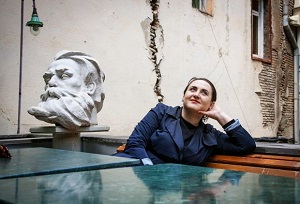
Nino Haratischwili (Tbilisi, 8 juni 1983)
De Duitse dichter en schrijver Lutz Seiler werd geboren op 8 juni 1963 in Gera. Zie ook alle tags voor Lutz Seiler op dit blog.
das neue reich
fernsprechrauschen, vogelhusten: zuerst gehst du
noch einmal alles durch in den gedanken; die
blaue waffelkachel gab es schon, brusthoch
der braune sockel, öl und
die gebüsch-motive: nadelnd, fast
musik ist das
herausrieseln der stimmen aus
den kugellampen. kein
labyrinth & keine chandoshysterien, nur
wortgeruch & falsche nelken: früher
war es nicht vergittert dieses fenster, nicht
gemarkert diese schrift komm in
den totgesagten technikpark – fischgrätenestrich
im felderlatein
einmal begründet sind wir ein bast
auf der borke
zu gast in der rinde & inneres kind
der ausfall strassen. diese
strassen sind eine leise gesprochene
sprache noch über das einmal
gesagte hinweg an den gärten
ins felderlatein. dort
sitzt das kind auf einem hügel die
welt ist aus sand gemurmelte sprachen
rollen nach innen wollen
auch wasser brücken
& strassen
benötigen leise
rollende sprachen das
eigene kind im felderlatein
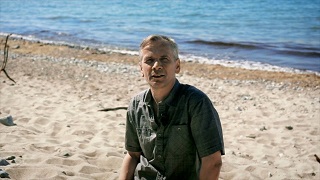
Lutz Seiler (Gera, 8 juni 1963)
De Duitse dichter, schrijver en vertaler Ulf Stolterfoht werd geboren op 8 juni 1963 in Stuttgart. Zie ook alle tags voor Ulf Stolterfoht op dit blog.
[stechapfel]
stechapfel: symptomerinnerung verschwommen. ein ständiges
kommen und gehen. nichtsdestotrotz soll ich die kinder nämlich
nennen. also gut: tanzwut, tobsucht, lachkrämpfe – oft platzt da-
bei die kopfhaut ab. das lappt! und wird begleitet von stechendem
durst. immer ratsam krug most. apfel gegen apfel in stellung ge-
bracht. trink mit bedacht. vermeid es vor allem, den kellner zu
reizen. der guckt schon. spürt einen durst von anderer art. überhaupt
macht man das ganze besser daheim, lädt sich befreundete melisti
ein, beißt rein und weiß den waschraum in der nähe. noch schöner
natürlich im freien. drei plätze – geprüft und für besonders geeignet
befunden: der zwetschgengarten hinter dem schickhardtstraßen-
gesundheitsamt, sehr steil und strengstens verboten, einstieg von
oben, bei nacht. im winter nimmst du am besten den schlitten mit.
ähnlich versprechend, genauso steil und genauso verboten: der wein-
berg oberhalb knodels, mit mittigem sprinkler und hütte für giftler.
die wußte schon der clan zu nutzen. zum dritten, und gleichfalls stark
hängend, aber erlaubt: amoener hag zwischen waldeck und sonnen-
berg, für wirklich alle arten des mißbrauchs empfohlen: hier lagert
die stirn unter birnen, bereitet den apfel der chef. das beste sind ja
die kerne. unstern darüber, sich stetig steigernder zwang. die anderen
orte unterliegen dem bann, bei bösem verkrust und wirkmachtverlust.
ich aber, alleine dem leser verpflichtet, nenne noch drei: faßkeller
unter der sakristei, luftschutzbunker rebenreute und herrn nemsyans
geradezu himmlisches dunkel. auch da ward man manchmal geduldet.
Ulf Stolterfoht (Stuttgart, 8 juni 1963)
De Hongaarse schrijver en film- en theaterregisseur Péter Gárdos werd geboren op 8 juni 1948 in Boedapest. Zie ook alle tags voor Péter Gárdos op dit blog.
Uit: Ochtendkoorts (Vertaald door Rebekka Hermán Mostert)
“Het was een wisselvallige zomerdag toen mijn vader Zweden binnenvoer.
De oorlog was net drie weken voorbij.
Er waaide een stormachtige noordenwind over de Oostzee en het schip dat op weg was naar Stockholm werd heen en weer gesmeten door metershoge golven. Mijn vader had een plek op het onderste middendek, waar de mensen op strozakken lagen en zich krampachtig aan de rand van hun ligplaats vastklampten om het verschrikkelijke deinen te weerstaan.
Nog geen uur na vertrek kreeg mijn vader het plotseling benauwd. Eerst hoestte hij bloederig schuim op en ging hij op zijn zij liggen, maar daarna begon hij zo luid te rochelen dat zijn doodsstrijd haast het geluid van de brekende golven tegen de scheepswand overstemde. Omdat hij als een ernstig geval werd beschouwd, was hij al bij voorbaat in de eerste rij vlak bij de klapdeuren gelegd. Zijn lichaam, licht als een veertje, werd nu door twee matrozen naar de naburige kajuit gedragen.
De scheepsarts aarzelde niet. Er was geen tijd voor pijnstillers. Hij stak een flinke naald tussen twee ribben in mijn vaders borstkas. Het was een godswonder dat de naald op de juiste plek uitkwam. Terwijl de arts een halve liter vocht tussen de longvliezen vandaan zoog, werd het zuigapparaat binnengebracht. De injectienaald werd vervangen door een kunststof buis, en met een pompje werd snel nog eens anderhalve liter vocht afgetapt.
Nu ging het beter met mijn vader.
Toen de kapitein op de hoogte werd gesteld van de succesvolle levensreddende actie, verleende hij de ernstig zieke man een grote gunst. Hij liet hem in een dikke deken gewikkeld op het bovendek plaatsnemen. Gezwollen wolken verzamelden zich boven het granietgrauwe water. De kapitein stond in een smetteloos uniform naast mijn vaders ligstoel.
‘Spreekt u Duits?’
Mijn vader knikte.
‘Gelukgewenst met uw ontsnapping.”
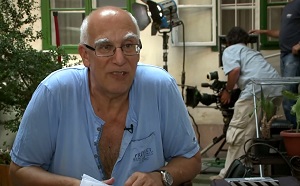
Péter Gárdos (Boedapest, 8 juni 1948)
De Australische dichteres en librettiste Gwen Harwood werd geboren op 8 juni 1920 in Taringa, Queensland. Zie ook alle tags voor Gwen Harwood op dit blog.
Last Meeting
Shadows grazing eastward melt
from their vast sun-driven flocks
into consubstantial dusk.
A snow wind flosses the bleak rocks,
strips from the gums their rags of bark,
and spins the coil of winter tight
round our last meeting as we walk
the littoral zone of day and night,
light’s turncoat margin: rocks and trees
dissolve in nightfall-eddying waters;
tumbling whorls of cloud disclose
the cold eyes of the sea-god’s daughters.
We tread the wrack of grass that once
a silver-bearded congregation
whispered about our foolish love.
Your voice in calm annunciation
from the dry eminence of thought
rings with astringent melancholy:
‘Could hope recall, or wish prolong
the vanished violence of folly?
Minute by minute summer died;
time’s horny skeletons have built
this reef on which our love lies wrecked.
Our hearts drown in their cardinal guilt.’
The world, said Ludwig Wittgenstein,
is everything that is the case.
– The warmth of human lips and thighs;
the lifeless cold of outer space;
this windy darkness; Scorpio
above, a watercourse of light;
the piercing absence of one face
withdrawn for ever from my sight.
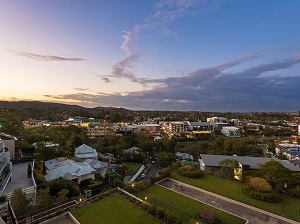
Gwen Harwood (8 juni 1920 – 5 december 1995)
Taringa
De Nederlandse schrijver Herman Jan (Han) Friedericy werd op 8 juni 1900 geboren in Stadskanaal in de gemeente Onstwedde. Zie ook alle tags voor H. J. Friedericy op dit blog.
Uit: De nieuwe gast
“Singapore, donderdagmorgen 10 uur.
Dat zal de nieuwe kamergenoot zijn. Ik hoor de deur opengaan en koffers neerzetten. Ik kan niet zien wat er gebeurt, want ik houd de halve deurtjes, die de grote hotelkamer in tweeën delen, altijd gesloten. Na al deze jaren lijkt mij niets aantrekkelijker dan wat eenzaamheid en niets schijnt moeilijker te verwerven.
De Chinese boy zegt iets en een Engelse, wat hese stem antwoordt. Het is de stem van een dikke man van een jaar of vijftig, van een man, die er alles van weet en die zich geen knollen voor citroenen laat verkopen. Zelfs niet na een tweede wereldoorlog. Dadelijk zal hij over de tochtdeuren kijken, mij zwetend en met een hoogrood gezicht in bed zien liggen en – als ik mijn ogen dicht heb – zich terug trekken, óf – als ik mijn ogen open houd – iets zeggen in de trant van ‘Good morning… what is the matter with you?’ Ik zal mijn ogen maar open houden, dan is het meteen gebeurd. ‘Nothing, serious, sir,’ zal ik zeggen, ‘a slight fit of dengue fever.’
Ik vind het jammer, dat de Australiër vertrokken is. Als hij zich ’s morgens gebaad en gekleed had keek hij over de Singapore-deuren heen en met zijn luide, joviale stem informeerde hij dan of ik me al wat beter voelde. Ik zei steevast ja en dan kwam hij, in het vroege morgenuur al transpirerend, op de rand van mijn bed zitten. ‘Mijn God, wat een hitte,’ zei hij onveranderlijk, de beslagen bril oppoetsend en mij vriendelijk, met de kleine, lichtblauwe ogen knipperend, aanziend, ‘maak me niet wijs, dat je het in deze streken ooit plezierig gevonden hebt.’ Ik had hem verteld, dat ik lang op Sumatra, Java en Borneo had gewerkt, dat ik nu met een opdracht van mijn regering in Singapore zat en dat ik van het Oosten hield. Wat deze liefde nu precies inhield, had ik hem niet verteld: in de eerste plaats had ik daar geen zin in en in de tweede plaats zou hij het niet begrepen hebben. In elk geval wilde het niet zeggen, dat ik me op dat moment gelukkig voelde. Daarvoor was ik te koortsig, had ik te veel pijn in al mijn ledematen en lag ik te lang wakker. Het is niet goed om wakker te liggen, vlak na een oorlog. Zij komen dan terug en lachen net als vroeger.“
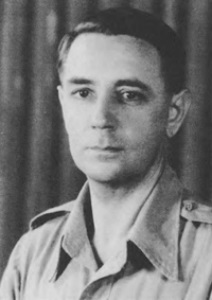
H. J. Friedericy (8 juni 1900 – 23 november 1962)
Onafhankelijk van geboortedata:
De Oostenrijkse dichter, vertaler, danser en choreograaf Udo Kawasser werd geboren in 1965 in Vorarlberg. Zie ook alle tags voor Udo Kawasser op dit blog.
Uit: Einbruch der Landschaft
„…meine neue Vermieterin, eine Mulattin kocht mir die wie Kartoffeln schmeckenden Malangas als Schonkost, sie hat mir auch ein Glas Wein mit einer Zigarre in einen Winkel gestellt, San Lázaro werde mir helfen, meinte sie und lächelte. liege nackt auf dem fadenscheinigen Laken des Lagers, möchte gerne ein wenig schlafen, aber der Metzger aus dem hinteren Gebäude muss schon wieder einmal am frühen Abend besoffen sein und beschallt die ganze Nachbarschaft mit Julio Iglesias, immer die gleichen, triefenden Lieder, schon seit zwei Stunden, doch niemand, der sich traute, bei ihm anzuklopfen wie mir Mayra, die Vermieterin erklärt hat, aus Angst, der Metzger könnte sie oder ihn das nächste Mal, wenn eine Ladung Fleisch ins Geschäft kommt, leer ausgehen oder einen höheren Preis zahlen lassen. das Fenster hier hat keine Scheiben, nur Holzläden mit Lamellen. Stimmen, Haushaltsgeräusche, plärrende Radios und Fernseher, das Rumpeln und Hupen unsichtbarer Autos werden vom böigen Wind hereingeweht, passieren in einem unentwegt geführten akustischen Angriff die porösen Wände (heißt nicht der Himmel bei Hölderlin Halle?), wie sich der eindringenden Außenwelt erwehren, mein Durchgangsleib, Havanna, das Glied, ein zusammengeschrumpfter Rumpffortsatz, liegt taub zwischen den Beinen, hat einen Tropfen Urin auf das Schamhaar geperlt, wische es mit dem Laken ab, da bricht der Luftstrom ab, ersterben die Fernseher, Radios und Julio Iglesias, auch die Deckenlampe ist mit einem Schlag erloschen: apagón, Stromausfall im Viertel, die Frage ist nur, wie lange es dauern wird, obwohl es mir hier, zum Siechtum verdammt, ohnehin gleichgültig sein kann. ob ich je wieder etwas von Vida hören werde, ohne die ich wohl nie von diesem Zimmer erfahren hätte, Mayra hat zwar keine Lizenz und das Zimmer ist in einem bedeutend schlechteren Zustand als das erste im Vedado, aber dafür zahle ich ihr weniger und selbstverständlich hatte ich nicht bleiben können, nachdem die Vermieterin, so eine Orientalin oder hatte sie zu Vida Palästinenserin gesagt, wie sie hier in der Hauptstadt abschätzig zu den Leuten aus dem Osten sagen… unmöglich länger dort zu bleiben!“
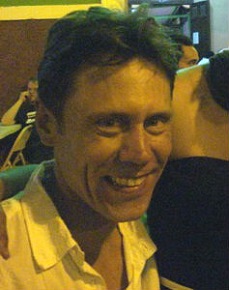
Udo Kawasser (Vorarlberg, 1965)
De Nederlandse dichter en schrijver Frank Keizer werd geboren in Leeuwarden in 1987. Met Maarten van der Graaff en Daniël Labruyère richtte hij in 2012 het online literaire periodiek “Samplekanon” op. Hij publiceerde in nY, Tirade, DW B, hard//hoofd en Het Liegend Konijn. Keizer debuteerde in 2016 met de bundel “Onder normale omstandigheden”.
want onder normale omstandigheden
ben ik opgegroeid
en in de crisisjaren ben ik volwassen geworden
dus is mijn poëzie een poëzie
van de crisis
waarin ik uiteengespat ben en schrijf
met wat er overblijft
de rotzooi die ik niet opruim
maar warm laat worden
in mijn handen, ingewanden
en het netwerk
dat oververhit raakt
en de weinig fijnzinnige realiteit toont
van iemand
die zevenentwintig is in 2015
en aan de beschrijving van zijn realiteit niet toekomt

Frank Keizer (Leeuwarden, 1987)
Zie voor nog meer schrijvers van de 8e juni ook mijn blog van 8 juni 2017.

